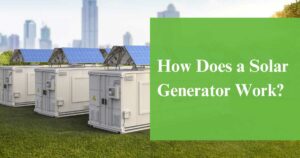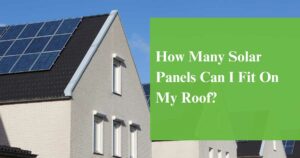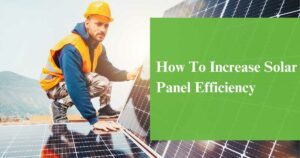How Long Do Solar Panels Last?
Page Contents
Written by qualified solar engineer Leonardo. Last updated:
High-quality solar panels last more than 25 years, and their payback period is only between 4 and 8 years. If you purchase panels with a solid warranty, the return on investment is assured. However, keep in mind that warranties are only valid if the panels are installed properly. Working with a qualified solar installer is strongly recommended.
Installing solar panels is one of the most effective ways to reduce your electricity bills. They may seem expensive at first, but their long-term savings are greater than their upfront cost. In other words, every dollar spent on a solar power system is recovered tenfold. After understanding how long solar panels last, it makes complete sense as an investment.
Understanding the Two Types of Solar Panel Warranties
When purchasing warranties, you will notice there are two types. One of them covers manufacturing defects, while the other covers electricity production. Each warranty protects your investment from different issues.
The warranty against manufacturing defects is normally for 10 to 12 years. If your solar panels are correctly installed and any of them fail, this warranty gives you replacements at no cost. Just keep in mind that the faulty panels must be removed and replaced, so make sure your solar provider offers support.
The energy production warranty is much longer, and leading solar manufacturers offer 25 years or more. Solar panels degrade over time like any power generation system, but this warranty covers you if they degrade faster than normal. High-quality panels will have at least 80% of their initial capacity after 25 years, and many warranties use this value.
- A panel with a power rating of 330W will have dropped to 264W after 25 years.
- If you use 20 of them in a 6.6-kilowatt system, the capacity after 25 years will be 5.28 kW.
Warranties are only useful if the manufacturer will be around in the future to make them valid. The best recommendation is purchasing panels from Tier 1 solar manufacturers: they offer quality products while being companies with financial health. Your solar warranty becomes useless if the manufacturer goes bankrupt!
Like with any other product, high-quality solar panels from top brands tend have a higher price. However, they are worth it when you consider performance and warranty coverage. Panels can last even longer than their 25-year warranty with adequate maintenance. However, keep in mind that energy production will wane over time, even with top-tier panels.
The long warranty period is one of the main factors that makes solar panels a good investment. Since the typical payback period is shorter than the warranty period, your power bill savings are assured. Just be warned that warranties are voided by an incorrect installation, hence the importance of working with a qualified installer.
Do Solar Panels Save Less Electricity over Time?
Due to the degradation rates of solar panels, you may be thinking that electricity savings will shrink each year. However, consider that kilowatt-hour prices tend to increase over time.
- If your panels lose 0.8% of their capacity in a year, but the local power company raises its tariffs by 3%, your electricity savings will increase.
- According to a research project by the National Renewable Energy Laboratory (NREL), most panels degrade at a rate of less than 1% per year.
When solar companies estimate the electricity savings and payback period of a solar energy system, they consider degradation rates. In other words, solar panels are a good investment even with their loss of production over time. Solar panel roofs have become popular for the simple reason that they make financial sense.
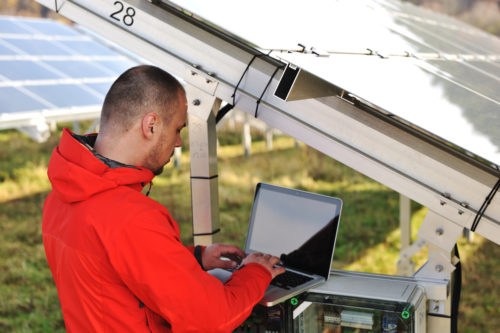
If you are planning a home addition in the future, you can simply increase the number of panels. This way, they can keep up with your electricity needs. You must only make sure that the additional panels are compatible with the original installation. You can also ask your solar installer to leave the provisions for an eventual expansion.
How Long Do Solar Inverters and Batteries Last?
Consider that the panels are only one part of an operational solar power system. Components like racking and wiring are very durable, and you can expect them to last as long as the panels. However, solar inverters have a shorter service life than panels, and you must plan for an eventual replacement. The same applies for batteries, in case your solar power system uses them.
Due to the way they work, solar panels produce electric power in the form of direct current (DC). However, your home appliances need alternating current (AC), which is the type of power provided by utility companies. Solar inverters gather the electricity produced by panels, converting it into AC power. However, the life expectancy of an inverter is only around 10 years, which means your panels will eventually need a new one.
The quality of your inverter is just as important as the quality of your panels. The leading inverter suppliers normally offer a 10-year warranty, similar to the panel warranty against manufacturing defects.
A solar power system can work without batteries, making them an optional component. However, they bring additional benefits when present:
- You can store solar energy for nighttime and cloudy days, which means you rely even less on the local power company.
- The battery system can assume the role of a backup generator during a blackout.
Lithium-ion batteries are now available with a 10-year warranty. Conventional lead-acid batteries last much less, normally between 1 and 3 years. Lithium-ion batteries are also more flexible and efficient, while lead-acid batteries must be fully charged between discharging periods.
The shorter service life of inverters and batteries does not mean they have a lower quality than solar panels. That is simply the current development stage of those technologies, and it is likely that more durable versions will be available in the near future.
Do Solar Panels Need Maintenance?
Compared with other renewable energy systems, solar panels have simple maintenance needs. If they are kept clean and protected from damage, a long service life is assured. In addition, since the panels don’t have moving parts, they are not exposed to mechanical wear.
Solar providers follow different procedures when calculating the cost of solar panels. When you receive offers, ask the providers about solar maintenance services. In fact, some companies may include a period of free maintenance after installing the solar system.
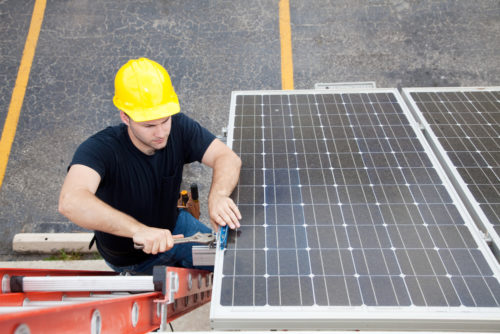
If you get solar power through a lease or Power Purchase Agreement (PPA), the contract will normally make the provider responsible for maintenance. This includes inverter and battery replacements after around 10 years, so you don’t have to plan and budget that purchase. In solar leases and PPAs, the price to pay for these benefits is sharing your savings with the provider.
Like any electrical device, solar panels must be protected with suitable circuit breakers. Panels without adequate electrical protection are more vulnerable to faults, and there is also a higher risk of fire or electric shock. However, this aspect is covered if your system is designed and installed by a qualified solar company.
Consider that 25 years is a long time, and your home surroundings can change. For example, trees around your home can cast shadows on the panels or on your solar panel roof, reducing their energy production. Avoid planting trees in locations where they can cause shading issues for your solar energy system, and make sure you trim any branches that block the sun.
References
We hope you liked this article. Please rate it or leave us a comment.
Average rating 4.9 / 5. Vote count: 13
No votes so far! Be the first to rate this post.



